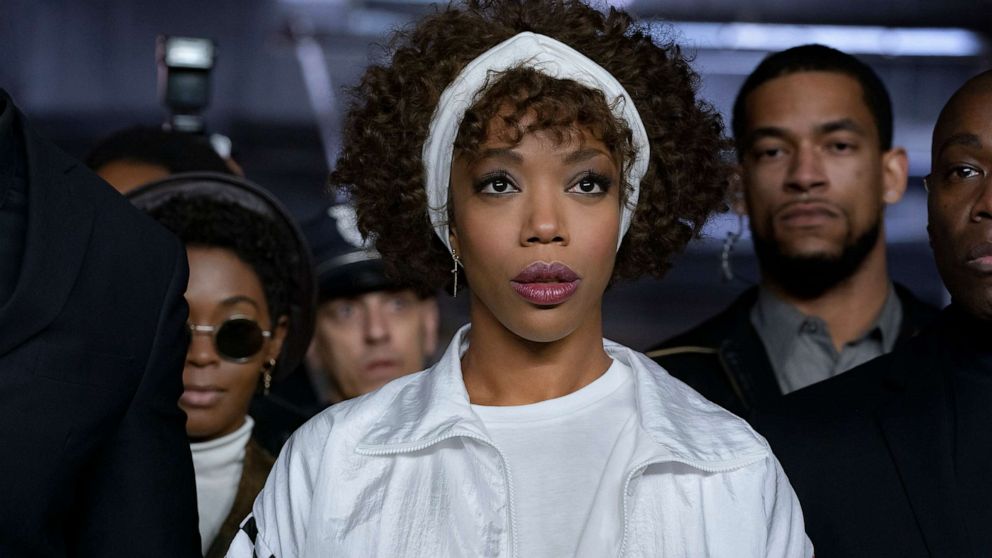By H. Drew Blackburn
The life of the greatest voice of her generation, or simply The Voice, is given the biopic treatment in Kasi Lemmons’ “I Wanna Dance with Somebody.” Glimpses of Whitney Houston’s (Naomi Ackie) struggles as an addict, queer woman, colossal pop star and wife to Bobby Brown all rear their ugly heads.
When we look back at the singer’s legacy, the aforementioned are the most glaring examples of tabloid fodder that begat grief and anxiety within. However, as the film explores, Houston faced vicious criticism about her Blackness that deeply affected her too. Murmurs and shouts from the peanut gallery to social justice leaders accused the singer of “selling out” to appeal to white audiences.
“I Wanna Dance with Somebody” suffers from thin dialogue and predictability — dull trappings intrinsic to biopics. However, it’s at its best when it acts as a celebration of Houston’s beautiful voice and reminds us of the line Black artists (often Black female artists) are expected to walk when they’re thrust into the public’s eye. For Houston, the idea she was a sellout has always been a ridiculous narrative that did little more than flatten and distress an enormous talent.
A key moment in “I Wanna Dance with Somebody” paints a picture of a pivotal 1989 evening Houston had in a room full of the recording industry’s biggest Black stars (and Kenny G). At the Soul Train Music Awards, co-hosted by her cousin Dionne Warrick, she met her would-be husband Bobby Brown, who performed twice — once with New Edition and again as a solo artist. During the presentation for the Best R&B/Urban Contemporary Single for a female artist award, a chorus of boos can be heard from the gallery. At the previous Soul Train Music Awards, she was met with the same reception. Both instances were not unanimously derisive; you can hear some applause, but when are jeers not the loudest vibrations inside an artist’s head?
In “Whitney: Can I Be Me,” a 2017 documentary on the singer’s life, Houston’s longtime saxophonist Kirk Whalum recalls the event as “emotionally devastating“ for her. “I don’t think [she] ever recovered from it. It’s one of those boxes that was checked, that when ultimately she perished, it was because of those boxes and that was a big one,” he said. Her mentor Clive Davis and the Arista label did steer her music in a direction that could appeal to as many people as possible. In the documentary, Kenneth Reynolds, the late publicity and marketing maven who helped launch Houston’s career in the ‘80s, said Arista intentionally avoided sounds similar to George Clinton or Parliament. Records that resembled something “too Black” were sent back to the studio. Label heads didn’t “want a female James Brown,” Reynolds said. Even with this knowledge, the public humiliation she faced at the Soul Train Awards seems gratuitous.
Another scene in “I Wanna Dance with Somebody” reads like a fictionalized account of various media appearances in which Houston had been forced to defend the music she made. A disc jockey asks what she thinks of the accusations she’s a sellout who isn’t a real Black artist. Houston responds, “if I’m not a Black artist, then what am I?”
It’s a beat in the film that perfectly sums up the absurdity of this claim that surrounded her career. Houston came from a long line of Black vocalists who began their journey inside the Black church, where she received guidance from her mother, Cissy Houston, a talented singer in her own right with a voice great enough to serve as a backup singer for Aretha Franklin and countless others.
To wit: Whitney Houston was a Black woman — ate Black, slept Black, lived Black, cried Black, walked Black and died Black. It’s a wonder how Houston could do anything other than sing Black too. Houston appealed to so-called mainstream audiences because she was The Voice. The “girl-next-door” image crafted by Davis, Reynolds, and the Arista team was built to usher her into a wider variety of homes, but Houston’s singular talent was the chief agent of her success. And who’s to say a Black woman cannot be the “girl-next-door?” That’s asinine and only dulls the beauty in which there are myriad ways a person can be Black.
Houston was a pop princess, but the charge that such a thing made her inherently a non-Black star is peculiar for a number of reasons. While funk was never really her thing (funk isn’t exactly a genre known for divas of her vocal caliber), R&B was an ever-present force in her music from Day One and in the thick of the days when she was called an “oreo” and “Whitey Houston.” Her very first single, after all, was “Hold Me,” a duet with Teddy Pendergrass. The most peculiar aspect of this criticism is the fact that nearly all American music is Black music. Black people are the architects of innumerable lush sounds, from rock ‘n’ roll to country, and pop is just one of them. Houston merely made all the music she was capable of.
While Houston has mostly elided criticism that she wasn’t Black enough or didn’t make Black music, the spirit of this indictment lives on today. Musicians like Lizzo and Doja Cat receive the same complaints Houston did over three decades ago, but with the added component of social media’s instantaneous nature. What do these and other appraisals of Blackness actually achieve other than the ability to break one’s soul?

